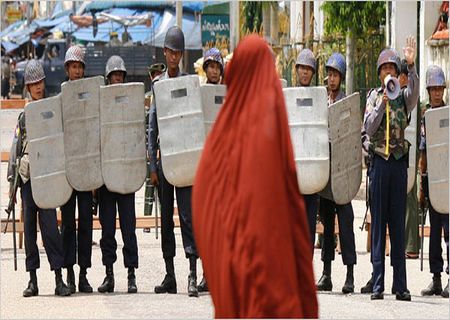By Eric Paulsen
If the ASEAN Inter-govermental Commission on Human Rights (AICHR) lives up to the mark of the European Court of Human Rights or to a lesser extent the Inter-American Commission of Human Rights, it will be the most curious thing I ever saw in my life!
 Military rule in Myanmar (Source: stolenchildhood.net)
Military rule in Myanmar (Source: stolenchildhood.net)
Sometime ago, I received an e-mail on a question by Senator Tunku Abdul Aziz at the Dewan Negara, seeking an explanation as to why the government was not lobbying for the establishment of an ASEAN Court of Human Rights. The Ministry of Foreign Affairs replied that the government was not pursuing such a regional mechanism because ASEAN has adopted to establish the ASEAN Inter-governmental Commission on Human Rights during the 15th ASEAN Summit in October 2009!
ASEAN-human-rights what? Since when? Well, since November 2007 actually, when ASEAN adopted the ASEAN Charter. What ASEAN Charter? (Isn’t it worrying that the government is making these important decisions that affects the country, and there is no meaningful debate or consultation with the people, civil society, political parties, and Parliament, or even highlighted in the press?)
At first sight, this probably seemed more like a cruel joke; ASEAN known more for its economic cooperation, “non-interference in the internal affairs of member states,” “decision by consensus” and “Asian values,” and probably the ASEAN games – in November, 2007 during the 13th ASEAN Summit adopted the landmark ASEAN Charter with some momentous reference to human rights and democratic ideals:
- “adhering to the principles of democracy, the rule of law and good governance, respect for and protection of human rights and fundamental freedoms.”
- “to strengthen democracy, enhance good governance and the rule of law, and to promote and protect human rights and fundamental freedoms, with due regard to the rights and responsibilities of the Member States of ASEAN.”
- “respect for fundamental freedoms, the promotion and protection of human rights, and the promotion of social justice.”
More astonishing is Article 14 of the Charter which sets out the foundation for the establishment of an ASEAN human rights body. It states:
- In conformity with the purposes and principles of the ASEAN Charter relating to the promotion and protection of human rights and fundamental freedoms, ASEAN shall establish an ASEAN human rights body.
- This ASEAN human rights body shall operate in accordance with the terms of reference to be determined by the ASEAN Foreign Ministers Meeting.
This is certainly curious as most of the member states like Burma, Laos, Vietnam, Cambodia, Singapore, and Malaysia are hardly known to be human rights advocates. The opposite is more correct – that most, if not all ASEAN member states are more known as human rights abusers.
Whenever “ASEAN” is mentioned together with “human rights” – invariably, it is in the context ASEAN’s inability to reign in its most infamous human rights abuser, Burma. Other common phrases that come to mind include “talk shop” and “big on words but small on action.”
It got curiouser and curiouser when a High Level Panel was formed in July 2008 to draft the Terms of Reference on the establishment of the ASEAN human rights body and progressed to its eventual adoption during the 15th ASEAN Summit in October 2009. It would thus appear that we may get a human rights body in the region after all. The joy should however be tempered with extreme caution as the Terms of Reference in many parts are ambiguous, restrictive and incongruous with international human rights standards and practices, for example:
- adherence to cultural relativism, non-interference and decision by consensus;
- unclear provisions on its access by individuals and civil society organisations;
- unclear mandate and function: whether it can assess and review the general human rights situation in the region; carry out on-site visits to investigate violations; and establish an individual complaint mechanism;
- lack of enforcement mechanism;
- lack of independence from member states including security of tenure for its commissioners.
So what is to be done to ensure that the ASEAN human rights body – to be known as the ASEAN Inter-governmental Commission on Human Rights (AICHR) – is in line with international standards and practices rather than one that protects and promotes non-interference in the internal affairs of its member states, decision by consensus, cultural relativism and of course Burma?
On the part of Southeast Asian civil society organisations, they have long advocated and struggled for a regional human rights mechanism although engagements and consultations with the relevant ASEAN structures on AICHR up to the present stage (translating the Terms of Reference to the Rules of Procedure and the actual set up) have been somewhat limited and ineffective.
So what is to be done? Continue advocating I suppose; to be optimistic, to keep the faith and to constantly try and try again (as is the philosophy of most human rights advocates) and demand that the AICHR conforms to international standards and practices as otherwise what is the point?
We can start by insisting that all ASEAN member states as part of the UN are obliged to promote and encourage respect and observance of human rights and fundamental freedoms for all as stipulated in the UN Charter, the Universal Declaration of Human Rights and other instruments and standards. These states have further solidified their commitment on women and children rights by having ratified the UN Convention on the Elimination of all Forms of Discrimination against Women and the UN Convention on the Rights of the Child.
The AICHR should accept without reservation that human rights as defined and developed over the years contain certain imperative and core characteristics, without which, could not be properly considered as human rights: that all human rights whether economic, social, cultural, political or civil are Universal, Inalienable, Indivisible, Interdependent and Interrelated; protect, respect and promote Equality and Non-discrimination; Participation and Inclusion; and Accountability and Rule of Law.
Further, the AICHR should accept the UN Paris Principles relating to the Status of National Institutions and other best practices as equally applicable because the body’s purpose, mandate and function are largely similar to national human rights institutions. This adoption is highly desirable as it will make the AICHR more credible, competent, effective, and enable it to work harmoniously within the international community and the international human rights laws and standards framework.
These principles include the body’s capacity to maintain Independence; Defined Jurisdiction; Cooperation; Adequate Power; Accessibility; Operational Efficiency; Accountability; and Duty of Fairness and Procedural Simplicity.
But knowing ASEAN and the Terms of Reference, it seems a certainty that the AICHR will not be up to the mark like the European Court of Human Rights or to a lesser extent the Inter-American Commission of Human Rights, because if it is, it will be the most curious thing I ever saw in my life!
Eric Paulsen is a member of Lawyers for Liberty, a newly formed human rights and law reform initiative (still work in progress).

